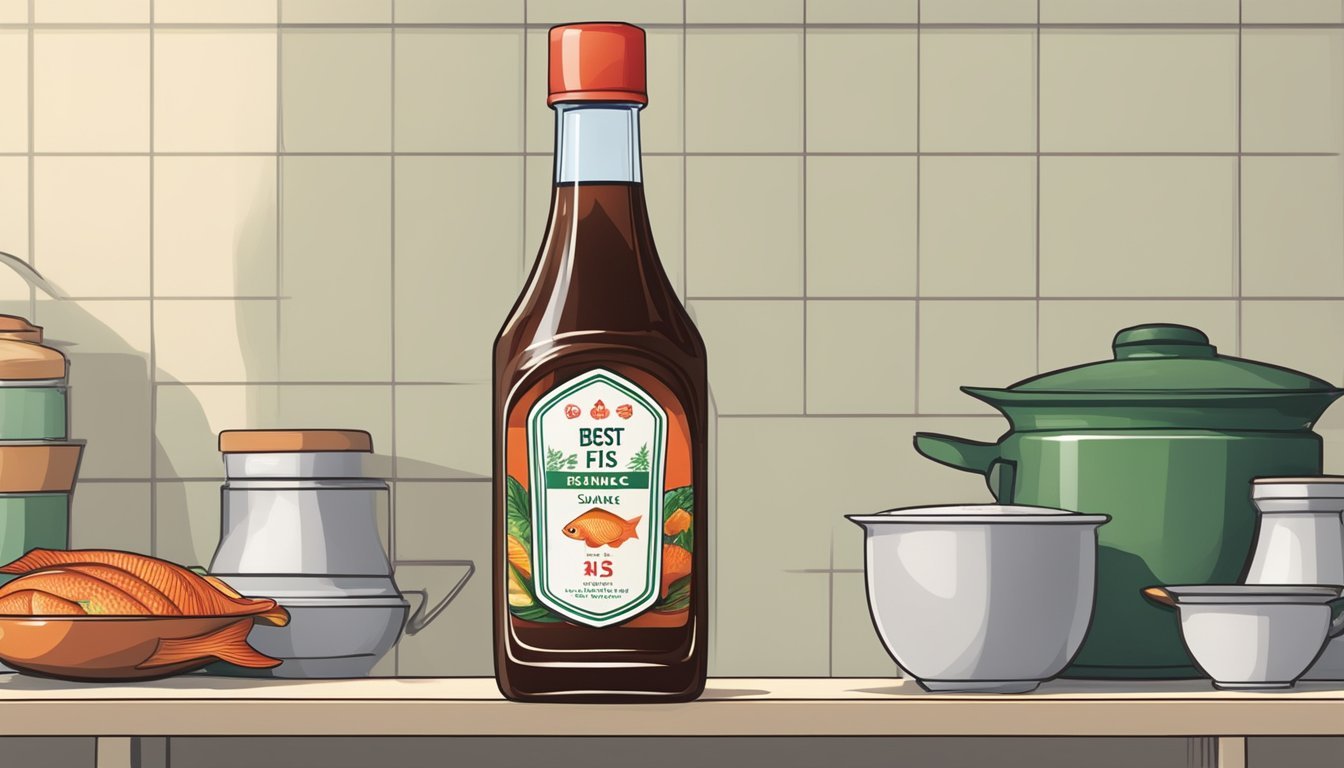How Long Does Fish Sauce Last?
Unveiling Shelf Life and Storage Tips
Fish (What wine goes well with fish?) sauce is a staple ingredient in many Southeast Asian cuisines, revered for its ability to impart a rich umami flavor to dishes. It is a fermented condiment made from fish or krill that have been coated in salt and left to ferment for a period of time. Due to its high salt content, fish sauce is well-preserved and has a lengthy shelf life, which is a key consideration for both home cooks and professional chefs who rely on its distinctive taste.
When stored properly in a cool, dark place, an unopened bottle of fish sauce can retain its quality for two to three years. Opening the bottle shortens its shelf life, yet it can still be kept in similar conditions for approximately a year without significant quality loss. Refrigerating fish sauce can further extend its viability, allowing it to maintain its characteristic flavors for up to three or four years, even beyond its best-before date. Despite these general timeframes, consumers should always check for signs of spoilage, as the sauce's aromatic and flavor profile can degrade over time, affecting its culinary contribution.
Fish Sauce Fundamentals
Fish sauce, a staple in many Southeast Asian cuisines, is renowned for its ability to impart a complex umami flavor. This section delves into its composition, culinary uses, and what exactly defines this flavorful condiment.
What Is Fish Sauce
Fish sauce is a liquid condiment derived from the fermentation of fish with salt. It is typically made from anchovies, (What wine goes well with anchovies?) but mackerel, krill, and squid are also used. The fermentation period can last from several months to years, resulting in a rich, savory flavor that is essential to the character of many East Asian dishes.
Composition and Ingredients
The fundamental ingredients of fish sauce are small fish or seafood and salt. During fermentation, these proteins break down into amino acids, releasing a distinctive umami flavor. Quality fish sauce has a clear, amber appearance, indicating proper fermentation and aging. The final composition is a concentration of taste with a high level of natural glutamates, which are responsible for the umami taste.
Culinary Uses
Fish sauce is integral in Southeast Asian cuisine and has a wide array of culinary applications:
Southeast Asian dishes: It's a foundational element in dips, marinades, and sauces.
Flavor enhancer: The umami-packed condiment accentuates the taste of stir-fries, curries, and stews.
Salt substitute: Fish sauce can act as a natural substitute for salt, providing a richer flavor profile.
The condiment’s versatility is evident in its ability to blend seamlessly with a variety of ingredients, elevating the overall savoriness of dishes.
Ideal Storage Practices
To maximize the shelf life of fish sauce, addressing storage conditions is crucial. Two factors significantly influence the preservation of fish sauce: the environment in which it's stored and the choice between refrigeration and keeping it in the pantry.
Proper Storage Conditions
Fish sauce should be kept in a cool, dark place to maintain its quality. A pantry or cupboard away from heat sources and sunlight is typically recommended. It should be stored in an airtight container, with the lid tightly sealed to prevent oxidation and contamination, which can affect the flavor and freshness.
Refrigeration vs. Pantry
Refrigeration:
Extends shelf life beyond the best-before date
Recommended for longer storage (up to 3-4 years)
Helps maintain flavor and quality
Pantry:
Suitable for shorter-term storage
Cool and dark location is essential
Ensures easy accessibility for frequent use
Both refrigeration and pantry storage can be effective, but refrigeration is often favored for long-term preservation of fish sauce.
Shelf Life and Expiration
Fish sauce, a staple condiment in many cuisines, is known for its long shelf life owing to the fermentation process. Precise duration depends on storage conditions and whether the bottle is opened or unopened.
Unopened Shelf Life
An unopened bottle of fish sauce typically lasts for about 2-3 years if stored in a cool, dark place. The high salt content and fermentation extend its longevity, preserving the liquid before opening.
Opened Shelf Life
Once opened, the shelf life of fish sauce reduces, but it remains usable for 1-3 years. For optimal quality, storing opened fish sauce in the refrigerator is recommended to extend its flavorful profile.
Best-By and Expiration Dates
While fish sauce may not have a set expiration date, manufacturers often provide a best-by date to indicate peak quality. It is common for fish sauce to remain safe to use beyond this date, especially with proper storage practices.
Monitoring Fish Sauce Quality
When it comes to maintaining the quality of fish sauce, one needs to be vigilant about assessing its freshness and watching out for any signs of spoilage. Sensory changes such as alterations in color, smell, and taste are key indicators.
Assessing Freshness
Color:
Typical: A proper fish sauce should have a clear, reddish-brown hue.
Concerning: Any notable discoloration can indicate a loss of quality.
Smell:
Expected: Fish sauce has a distinct, pungent smell that is characteristic and potent.
Altered: A sour or rotten smell is a red flag.
Taste:
Standard: It should taste salty with a hint of savory umami.
Off: A taste that deviates significantly from its usual profile could suggest spoilage.
Signs of Spoilage
Appearance:
Normal: Expect a smooth texture without sediment.
Warning Signs: Cloudiness, sediment, or a slimy texture.
Mold Growth:
If there is any visible mold growth on the surface or inside the cap, the sauce should be discarded.
Storage Duration:
Opened Bottle: 1 week to 1 month at room temperature can be acceptable, beyond which refrigeration is advised.
In Refrigerator: Properly stored, an opened bottle can last several months up to a year.
It's crucial to routinely inspect the fish sauce's sensory characteristics and to adhere strictly to recommended storage practices to ensure its continued quality.
Extended Preservation Techniques
Enhancing the longevity of fish sauce involves methods that go beyond typical storage practices. The two techniques discussed here are designed to further preserve the quality and flavor of the fish sauce over extended periods.
Freezing Fish Sauce
Freezing is a conceivable method for preserving fish sauce, though not commonly recommended due to its high salt content, which lowers the freezing point. Freezing may alter the sauce's flavor and texture. If one chooses to freeze fish sauce, they should ensure it is in a well-sealed container to prevent freezer burn and odor transfer.
Long-Term Preservation Methods
Long-term preservation leans heavily on the correct balance of temperature and environment. Keeping fish sauce in a cool and dark place, such as a pantry, can maintain its quality. For extended shelf life, storing the fish sauce in a refrigerator is advisable, as the cool temperature slows down any degradation processes. Preservatives in fish sauce typically contribute to its longevity, allowing it to last for years when unopened and properly stored.
Health and Safety Considerations
When assessing the safety and shelf life of fish sauce, one must consider the potential for spoilage and bacterial growth. It's essential to recognize signs of degradation and adhere to food safety precautions to prevent consumption of spoiled fish sauce.
Recognizing Bad Fish Sauce
To determine if fish sauce has gone bad, look for the following signs:
Smell: Fresh fish sauce has a strong, distinct aroma, but if it smells off or extremely sour, this may indicate spoilage.
Color: If the fish sauce has darkened significantly compared to its original color, it could be a sign of deterioration.
Texture: The presence of mold or noticeable changes in texture, such as excessive cloudiness or sediment that doesn't dissipate after shaking, may also signal spoilage.
Taste: A taste test should be the last step, and any unusual or particularly harsh flavor should be taken as a warning.
Food Safety Precautions
To ensure the quality and safety of fish sauce, adhere to these guidelines:
Safety Date: Always check the expiration date and follow the product's safety date recommendations for best quality.
Storage: Keep fish sauce in a cool, dark place away from heat or sunlight which can accelerate spoilage.
Refrigeration: Once opened, refrigerate to slow down bacterial growth and extend shelf life. Although refrigeration isn't strictly necessary due to the high salt content, it is advisable for long-term storage.
Hygiene: Use clean utensils when handling to prevent contamination with bacteria that can lead to spoilage.
Consumption: If there's any doubt regarding the fish sauce's quality or safety, it's better to err on the side of caution and dispose of it to prevent foodborne illness.
Enhancing Dishes With Fish Sauce
Fish sauce is a robust condiment that carries the essence of the ocean to a variety of dishes. Its unique flavor profile can transform a range of recipes from good to exceptional.
Cooking With Fish Sauce
Fish sauce is an essential element in culinary traditions, particularly in Southeast Asian cuisine. One utilizes it not only to impart a deep umami flavor but also to salt dishes subtly. Chefs prefer adding fish sauce during the cooking process to allow its flavors to meld with the other ingredients.
Intensity Control: A small quantity can suffice, usually a teaspoon or two for a family-sized dish.
Versatile Pairing: It complements spices and herbs, enhancing marinades, stir-fries, and soups.
Recipes and Tips
The application of fish sauce extends beyond traditional Asian dishes. It serves as a versatile ingredient in contemporary recipes:
Dipping Sauces: Combine with lime juice, garlic, and chili for a zesty dip.
Salad Dressings: Whisk with olive oil, vinegar, and a hint of sugar to elevate greens.
Experimentation is vital when cooking with fish sauce. Beginning with smaller amounts and tasting as one goes can prevent overpowering the dish. It should provide background depth, working in concert with spices and herbs, not overshadow them.
Troubleshooting Common Issues
Maintaining the quality and flavor of fish sauce is crucial for its use in culinary applications. This section will address the common issues of sedimentation and flavor loss, and provide guidance on how to deal with them.
Dealing With Sedimentation
Over time, fish sauce may exhibit sedimentation at the bottom of the bottle, which can include protein precipitation or salt crystals. Protein precipitation occurs when long-chain proteins break down and settle, while salt crystals may form due to evaporation of water. To troubleshoot:
Inspect: Check the bottom of the bottle. Sedimentation does not necessarily mean spoilage.
Shake Gently: If the sediment dissolves easily, the fish sauce is still good to use.
Discard if Uncertain: If sedimentation is accompanied by an off smell or changes in color, it's safer to discard the product.
Preventing Flavor Loss
To maintain peak quality and flavor, proper storage is key:
Store Properly: Keep fish sauce in a cool, dark place and ensure the cap is tightly sealed after each use.
Refrigerate: Once opened, storing fish sauce in the refrigerator can prolong its quality.
Note Flavors: If the fish sauce has lost its distinct flavor profile, it may still be safe to consume but could detract from the taste of your dishes.
Comparative Insights
This section provides an in-depth comparison of fish sauce's longevity in relation to other condiments and addresses the traditional variances found in the preparation of fish sauce across different cultures.
Fish Sauce vs. Other Condiments
Fish sauce typically has a longer shelf life than many other condiments due to its high salt content and fermentation process. For example, ketchup and mustard (how long does mustard last?) usually stay fresh for about 1 year after opening, while fish sauce can last for up to three years.
Soy sauce, another fermented condiment with similar preservative qualities to fish sauce, often remains in good condition for around 2 years after being opened. Both of these Asian staples outlast condiments like mayonnaise, which has a much shorter lifespan of 2-3 months post-opening.
Condiment Shelf Life After Opening Fish Sauce Up to 3 years Soy Sauce Up to 2 years Ketchup ~ 1 year Mustard ~ 1 year Mayonnaise 2-3 months
Cultural Variations of Fish Sauce
Vietnam produces a renowned variety of fish sauce called Red Boat Fish Sauce, celebrated for its purity and flavor. The process of creating this sauce involves fermenting anchovies with salt and storing them in wooden barrels for over a year, contributing to its distinguished taste and longevity.
In Southeast Asian and East Asian cuisines, fish sauce is not just a condiment but a core ingredient, essential for authenticity in traditional dishes. Across cultures, the making and the use of fish sauce vary. In Vietnam, for example, fish sauce is an indispensable part of the country's culinary identity and is used in numerous dishes to enhance flavor, whereas in other regions, it might be used more sparingly or in combination with other ingredients.
Each region's climate can also affect the fermentation process and the shelf life of the fish sauce. Nevertheless, regardless of these cultural variations, the foundational elements of high salt content and long fermentation periods generally lead to a shelf life that surpasses that of many other condiments.
Interpreting Labels and Dates
When examining fish sauce in a store or one's pantry, labels and dates are crucial indicators of freshness and safety. Labels typically offer a best-by date, which manufacturers provide to indicate peak quality. It's essential to differentiate this from an expiration date, which is more frequently associated with safety rather than quality.
A best-by date suggests when the product may start to diminish in flavor but does not necessarily mean it is unsafe to consume beyond that point. Fish sauce is known for its high salt content, which acts as a natural preservative. This characteristic often allows fish sauce to maintain its quality longer than the date indicated.
Here is a simple breakdown to understand these markers:
Best-by Date: Focuses on quality and taste.
Expiration Date: Less common; more about safety.
For consumers concerned about safety, it's rare to find a safety date on fish sauce, simply because it doesn't spoil easily due to its preservative nature. However, if a bottle shows signs of spoilage such as mold or off odors, it should be discarded regardless of dates.
Storage after opening can affect longevity. Keeping fish sauce in a cool, dark place and tightly sealed will help preserve its quality. If stored properly, consumers can expect their fish sauce to retain its flavor for up to a year past the best-by date, though this can vary depending on the brand.









